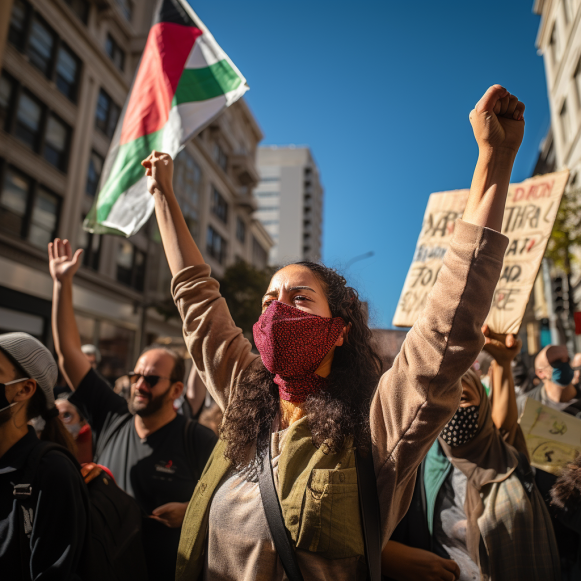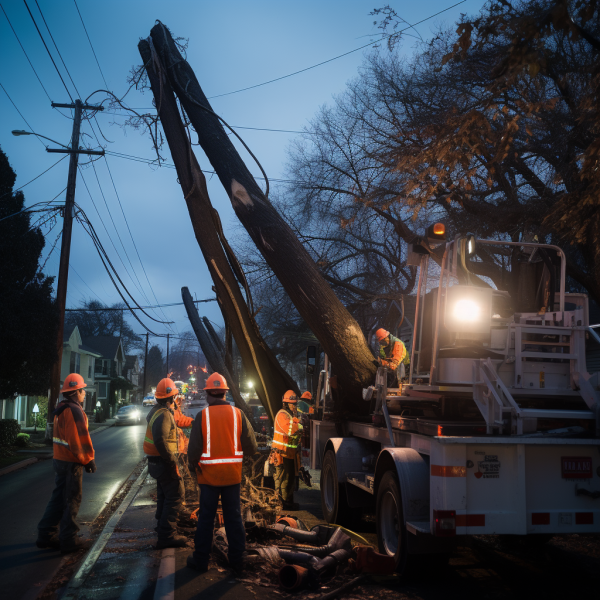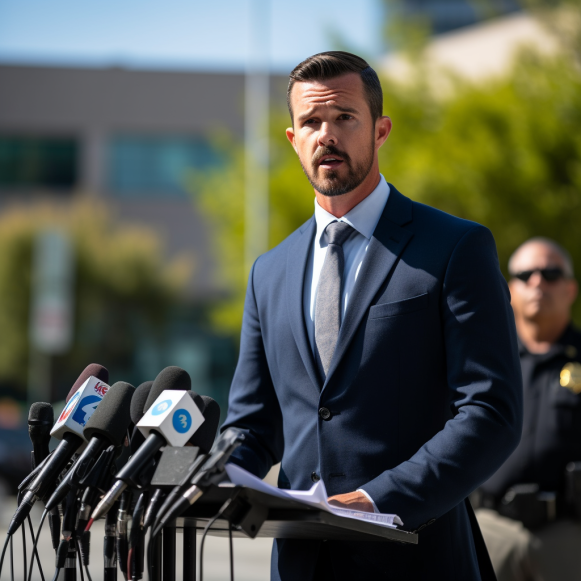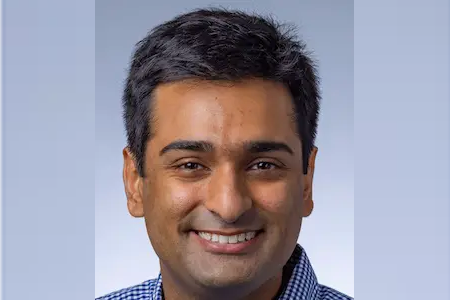As Palestinians flee, Bay Area residents with relatives in Gaza wake up to texts of death and loss

“You just hear their voices cracking, just this intense fear.”
Wael Buhaissy has been staying up late at his San Ramon home all week. He can’t take his gaze away from his phone, which is receiving messages from his extended family 7,000 miles away.
This is the reality for thousands of Palestinian Americans in the Bay Area whose loved ones and friends are being held hostage in Gaza.
Buhaissy, 55, can hardly speak of the devastation described in the messages he’s received as Israeli bombs rain down in retaliation for Hamas’s deadly terror attacks last week, which killed hundreds of Israelis. Buhaissy learned that one of his cousins, Mohamad, along with Mohamad’s son, Hamdan, and 2-year-old granddaughter, Nour, had been killed.
Another cousin, Mazoza, wrote on Facebook, which Buhaissy, a 35-year Bay Area resident, read aloud: “I am speechless at what’s happening,” he wrote. “Every little while, there is a nearby massacre.”
A week after Hamas launched the deadliest attack on Israel in its 75-year history and Israeli forces retaliated, Palestinians in Gaza have been hiding in basements and schools as bombs rained down around them, unsure whether they will be allowed to leave. Thousands began packing their belongings and fleeing on Friday as Israeli troops gathered on Gaza’s northern border and the Israeli government demanded that 1.1 million Palestinians relocate south.
There is little room for understanding for Bay Area residents who have friends and family on both sides of the conflict. Some locals with Israeli roots who witnessed the carnage and kidnappings of civilians perpetrated by Hamas last week have returned to serve in the Israeli military. Those with ties to Gaza, whose loved ones feel as if they have been living in a “open air prison” for decades under Israeli occupation, have protested in front of San Francisco’s Israeli consulate and are attempting to mobilize aid within Gaza despite blockades.
Many people pray for peace. Many people want justice.
Director Zeiad Shamrouch and his team at the Berkeley-based nonprofit MECA, Middle East Children’s Alliance, have been providing filtered drinking water, building schools, and providing meals to Palestinian children for decades. They’re almost out this week. Nonetheless, he said his colleagues in Gaza are risking their lives to drive around the city in search of food and medical supplies for the families who are sheltering in schools. So far this week, he claims his organization has fed approximately 2,500 people.
“We are in a hurry because we know that soon we may have nothing to do in Gaza because we don’t have any resources,” Shamrouch said from his Berkeley office, where he has been monitoring events all week. He was born in a Bethlehem refugee camp in 1964 and raised in a 9-by-9-square-foot room with his parents and four siblings. Until 1976, his family did not have a private bathroom.
He’s been in contact with the head of his nutrition program as WiFi connections allow, and she told him she’s living in a single-family home with three-dozen family members who gathered for refuge over the past week. The majority are children.
“It’s not just about safety,” Shamrouch, 58, said of the current living conditions in Gaza. “It’s about security — letting us be together if something were to happen.” Allow us to be in each other’s presence.”
Since Hamas’ sneak attack and bombings on Israeli villages last week sparked the crisis, more than 2,000 Palestinians and 1,300 Israelis had been killed as of early Saturday. The majority of the victims on both sides of the border have been civilians.
All humanitarian aid has been barred from entering Gaza, trapping the territory’s 2.4 million people inside the narrow strip of land for days. The only power plant in Gaza has shut down. The majority of residents do not have access to safe drinking water. Airstrikes have smashed hospitals and ambulances. According to the United Nations Office for the Coordination of Humanitarian Affairs (OCHA), over 420,000 Palestinians have been displaced.
The Israeli government has declared that the area will be under siege until Hamas, the US-designated terrorist organization that controls the Gaza Strip, releases the 120 Israeli hostages kidnapped during the weekend attacks.
President Biden reiterated Friday night that the “United States stands with Israel,” while declaring the growing “humanitarian crisis” in Gaza a top priority.”We can’t lose sight of the fact that the overwhelming majority of Palestinians had nothing to do with Hamas and these appalling attacks, and they’re suffering as a result as well.”
Sharif Zakout has been staying up late in San Francisco, glued to his TV for news from Gaza, scanning his phone for text messages from friends and relatives there, and speaking with loved ones trapped on the rare occasions when a call gets through.
“You just hear their voices cracking, just this intense fear,” said Zakout, 33, a San Francisco-based organizer with the Arab Resource and Organizing Center. Every day this week, Zakout’s situation worsens.
On Monday, one of Zakout’s friends informed him that his house had been destroyed. Another claimed that his uncle had been murdered. Another friend revealed on Wednesday that a dozen members of her family were killed in air strikes in a single night.
“Every day, this has been our reality — waking up to texts that say, ‘I have lost this family member, or this part of my city is now destroyed,'” said Zakout, who was born in San Francisco and grew up hearing stories about his grandmother’s refugee experience and being forced to flee her homeland as a child. “It’s been incredibly heartbreaking, and in so many ways, we feel powerless.” When we don’t hear from them, I’m not sure if it’s because they don’t have internet access or if I should assume the worst.”
As many Palestinians began to flee to the south, the UN warned that Israel’s demand to relocate over a million people across Gaza would have “devastating consequences.” Instead, the organization is hoping that Israel will allow the passage of humanitarian aid, such as food, medical supplies, and drinking water.
On Saturday, Israel and Egypt agreed to allow American citizens in Gaza to cross into Egypt, and talks to allow aid into the territory via the same crossing were ongoing.
Meanwhile, Zakout waits, worries, and checks his phone for word from his relatives.
“There’s a very clear sense of desperation,” he told me.





